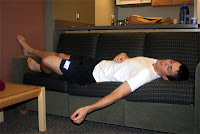Bell-Ringer: Individual reading for your contemporary realistic novel -- and filling out a sheet about the use of language (simile, metaphor, sensory images, strong verbs) in your novel.
Contempory Novel 2.doc
Here is a link about simile and metaphor:
Figurative Language
and another:
Chart for Examples and Non-Examples of Simile and Metaphor
Here is a link giving examples of strong and weaker verbs: Verbs -- Strong and Weak
And here are some good examples of the types of passages you will look for in your book:
Simile:
"He [felt] a throbbing like a snake slithering in and out of the tendons in his left leg." -- Kim Russon writing Giver Chapt 24, 2/4/03
Another sample simile: from Heat by Mike Lupica, pg 3
"He . . . saw the fat cop. . . wobbling like a car with a fat tire. . . . "
Description:
The zookeeper pointed at the smallest and darkest of the chimpanzees in the cage. It was unkempt, thin, and solitary, with twigs, dry leaves, and bits of fruit in its fur, and a forlorn expression.
Strong Verbs rather than weak ones:
scrubbed instead of cleaned in "We cleaned the toilets."
stomped or slunk or slid instead of walked in "He walked into the room."
2. More apostrophes and imitating a sentence -- in your composition book.
What do these sentences have in common with the sentences we looked at last time?
A great scar in the earth's crust runs for almost 600 mines (960 km) along the coast of California. This is the San Andreas Fault, where the Pacific plate slowly grinds along the North American plate.
--- Andrew Langley, Hurricanes, Tsunamis, and Other Natural Disasters (2006)
Matilda's wonderfully subtle mind was already at work devising yet another suitable punishment for a poisonous parent.
-- Roald Dahl, Matilda (1998)
Locals say if you go up to "Jacob's Hill," stop on a bridge, put your car in neutral, and turn everything off, your car will roll across the bridge.
-- Wesley Treat, Heather Shad, and Rob Riggs, Weird Texas (2005)
Alan Ferko's face turned as red as Bo Peep's pigtail ribbons. -- Jerry Spinelli, Stargirl (2000)
it's vs. its (also "Showing rather than telling")
It’s an ugly Christmas tree. Its color makes me sick.
Notice what a difference effective detail and description makes. What is the difference between these two versions of the same sentiment?
“I don't like her Christmas tree at all.” and
“Don't even get me started about my Aunt Rose's Christmas tree. First of all, it's aluminum. Second of all, it's pink. I mean, like the color of PeptoBismol, which makes sense, because I get sick to my stomach just looking at it.” -- Neal Shusterman, The Schwa Was Here (2006)
To Imitate: Label in your compostion book, “To Imitate.” Copy and imitate this sentence:
Tally's eyes searched desperately for any sign of iron or steel in the cliff.
-- Scott Westerfield, Uglies (2005)
sample imitations from Jeff Anderson:
Ellen's eyes darted back and forth as she desperately hoped I'd drop some of my popcorn on the floor.
Andrew's eyes searched the cafeteria for his girlfriend. Back and forth went his brown eyes. She had disappeared.
-- Anderson's student Miranda.
__(Pronoun or noun)__'s ____(noun)___ ____(verb)____ etc.
3. Practice Core Test Stuff.
Test Practice --
A1 --done and corrected through Section C
A2 -- through C, B checked
A3 -- working on B and C -- not checked. -- Tried out lie/lay game with mild success.
A4 -- corrected A, worked on B and C -- tried out lie/lay game with a tiny bit better success.
_______________________________________
Lie/Lay -- More Examples
The Verb "Lay"
Jerry lays the newspaper carefully by the door. or The carriers lay the newspaper. . . .
Yesterday Jerry laid the newspaper by the door.
Jerry has laid the newspaper by the door everyday for the past year. He deserves a generous tip.
Jerry will lay the newspaper by the door.
Jerry is laying the newspaper by the door.
The Verb "Lie"
Right now, Cindy lies on the beach. or The girls lie on the beach.
Yesterday Cindy lay on the beach for two hours.
Cindy has lain on the beach for at least an hour everyday for the past two weeks.
Cindy will lie on the beach again tomorrow.
Cindy is lying on the beach. I wonder if she reads books while she's lying there.
__________________________
Reminder: Next week we will be taking the State Core Language Arts Test. Please come to school rested and having eaten a nutritious breakfast, and bring a clear water bottle -- all of which you should do everyday anyway!
Watch for a retake- test on external test features after core testing.
Download the PowerPoint about External Text Features:
external text feature test.ppt
Examples of External Text Features



